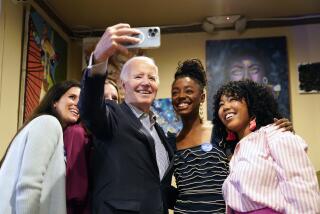Politics or No, Economy Will Rebound in ’92
- Share via
The overriding consideration in most thinking about the economy and markets in 1992 is that it’s a presidential election year. Indeed, the stock market lately has been playing Hail to the Chief almost every day, pinning its hopes on the President’s supposedly magical powers to command the economy.
But a triumphal march is premature. Stocks will cool early in ’92 as the outlook for corporate earnings remains unexciting--at least through the first quarter--and as President Bush inevitably disappoints great expectations in his Jan. 28 State of the Union message.
In that speech, White House aides predict, the President will deliver his program for the economy--including ideas for tax cuts. A new investment tax credit, limited to the next 18 months, is being discussed as a spur to business investment in new equipment.
Other goodies, such as individual retirement accounts and capital gains tax cuts, would be subject to political horse trading--if capital gains taxes were cut, for example, tax rates on high incomes would likely rise. All in all, the effect on the economy won’t be earthshaking. When it comes to taxes, someone’s ox is always gored.
Nonetheless the economy will pick up in ’92 with or without help from the White House. Look for gains in car sales; the industry could sell 14 million cars and trucks in the United States this year, up 6% or so from 1991. No big federal program will drive up sales, just the fact that people need transportation. A lot of vehicles sold in the banner car years 1985 and ’86 need replacing.
Telecommunications and computer electronics will be hot, as business invests for efficiency--especially hot if investment tax credits become law.
Unemployment won’t get much worse--or much better. Compared to recent decades, there aren’t many new people coming into the work force this year. On the other hand, companies are wary of over-staffing in a cost-conscious decade.
Home sales will see marked improvement. The blunt fact is that interest rates are as low as they were in 1964, and mortgage lending is still popular with banks and their federal regulators. At the end of last year, home sales were already brisk around Chicago, Salt Lake City and other parts of the country outside the struggling Northeast and California.
Low interest rates, which inspired the stock market’s year-end rally, will go a long way toward reviving business in the new year. To be sure, elderly savers are not thrilled at receiving less than 5% on deposits. And many worry about investing in higher-risk common stocks. But 10-year Treasury bonds, at close to 7% interest, offer a good alternative. That interest rate works out to a 3% return after taxes and inflation--historically the natural rate of return in non-inflationary times.
And there’s no sign of inflation in the 1992 economy. On the contrary, long-term interest rates are tending downward. If global investors feared that the White House or Congress would play politics with the economy, and thus risk inflation, they would dump Treasury bonds and send interest rates surging. There are many checks and balances in today’s world.
As to presidential magic, it’s true that the economy usually advances in presidential years--although it’s no sure thing and the effect is unpredictable. In 1960, the Eisenhower Administration came in with its fourth consecutive balanced budget. But the economy was tiring, and the White House didn’t offer any fiscal tonic, so the Republicans lost the election.
In 1980, interest rates hit 20% early in the year, but the Carter Administration got them back down below 12% by early summer, and the economy picked up. The Democrats still lost the election; hostages in Iran far outweighed economic factors.
The point is not to dope out the 1992 election but to show that politics and economics often run on different tracks. The U.S. economy, with a $5.6-trillion annual output of goods and services, is enormous, and while it respects leadership, it resists tinkering.
The difference between politics and economics is illustrated by a classic story involving Judge Sam Rosenman, counsel to President Franklin D. Roosevelt, and the 1936 reelection campaign in a nation still suffering the effects of the Depression. As the presidential train pulled into Pittsburgh, Roosevelt was apprehensive.
“Sam, we made promises when we were here four years ago, and we haven’t been able to keep a lot of them,” said the President.
“Franklin, if somebody asks, say you’ve never been here before,” was Rosenman’s political advice.
In fact, the economy rose in 1936 but stalled out in 1937 when Roosevelt, mistakenly believing that inflation was erupting, curbed federal spending just as deductions for the new Social Security program reduced take-home pay.
The message for ’92 is that even months of rhetoric from political campaigners won’t harm what is shaping up as a fairly solid business recovery. Happy New Year.
More to Read
Inside the business of entertainment
The Wide Shot brings you news, analysis and insights on everything from streaming wars to production — and what it all means for the future.
You may occasionally receive promotional content from the Los Angeles Times.










